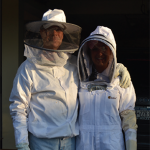It’s quite thought-provoking that the bees that set aside the honey for the winter are not going to be around to eat it: The life span of a honeybee (other than the queen) in the summer is only four to six weeks. This means that the bees working so hard to collect the pollen and nectar are not going to be around to dine on it during the winter. During the “nectar flow” in the spring and summer, they are frantically collecting pollen and nectar so the bees that come after them will survive the winter. The winter bees just have to hang around and eat honey, so they live for several months. If they don’t run out of food or freeze to death, they’ve got it made. Some call them “welfare bees” (not intended to be a political statement by the author).
The brain of a honeybee is about the size a sesame seed, so it does not seem likely that such concepts as altruism, self-sacrifice and hope for the future motivate them. Rather, I suppose this is all innate or instinctual. Their mental apparatus is not complex enough to pursue a degree, start a business, produce a work of art or, on the other hand, cheat on taxes, commit adultery or all sorts of other advanced human behaviors.
What If …
Watching bees is fascinating. Sometimes I ponder what the healthcare system would be like if we were bees. Everyone would have a very clear role, and everyone would be working together for a common goal, which is the health and survival of the colony. Otherwise, the colony does not survive through the winter.
Sure, it’s a fantasy, but what if doctors, hospitals, insurance companies and patients all worked together toward the idea that it is in everyone’s mutual interest that we all stay healthy? Indulge me for a moment; I know this is impossible, that it is not human nature, that we are considering a utopian concept. We pride ourselves on having a highly sophisticated medical system that keeps people living longer and healthier, and developing better medications and devices. But the cost is unsustainable, and the distribution of care inadequate.
If we were a bee colony, we would have to work together so the colony would be healthy and survive and not run out of honey before the next nectar flow in the spring. This is not an argument for universal healthcare or individual responsibility so much as it is a reflection on our lack of success in putting together an efficient healthcare system that gets the job done for everyone at a cost we can all afford. It seems like a logical idea, but between the free market and “government-run” healthcare, I cannot say that we are accomplishing that goal.
The Ideal
I know it’s naive and idealistic to propose that doctors, patients, insurers and regulators work together toward a common goal. It’s not going to happen, but you have to admit it would be a pretty good idea.

